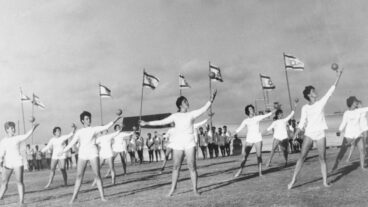Acting Prime Minister and Kadima leader Ehud Olmert hugs colleague Shimon Peres after the exit polls showed Kadima winning the most seats in Tuesday’s elections. (Photo: AP)The Kadima Party, led by Ehud Olmert, will likely be given the mandate by President Moshe Katsav to form the next Israeli government. With almost all the votes counted in Tuesday’s polls for the Knesset, the results showed Kadima with 28 seats, down from their expected mid-30s, Labor 20, Shas 13, Israel Beitenu 12, Likud 11,National Religious Party/National Union 9, Pensioners 7, United Torah Judaism 6, Meretz 4, United Arab List 4, Balad 3, and Hadash 3.
According the analysts, the outcome of the elections has set up a possible center-left bloc of 62 seats, consisting of pro-disengagement parties Kadima 28, Labor 20, Meretz 4, and the Arab parties 10.
Another alternative is a right-wing bloc, made of Likud (11), National Union-NRP (9), Israel Beiteinu (12), Shas (13) and United Torah Judaism (6). It garnered a combined representation of 51 seats – not enough to keep Olmert from forming a government.
Olmert was set to establish committees on Wednesday to lead the negotiations with other parties in order to attempt to reach an agreement on a feasible coalition for the government. The leader of the largest party is traditionally asked first by the president to try to form a ruling coalition.
The surprise of the election was undoubtedly the Gil pensioners’ party, led by 79-year-old former senior Mossad agent Rafi Eitan, which won 7 seats. Kadima officials expressed an interest in including in the coalition the party whose main demand is benefits for Israel’s senior citizens. The party’s MKs will have freedom to vote their conscience on diplomatic issues, according to Gil’s platform.
“Kadima has won today. The next prime minister is Ehud Olmert,” said Kadima MK Roni Bar-On, who, like Olmert and a host of other senior political figures, had followed Sharon out of the Likud to found a new centrist party.
Labor Party candidates said their party had won a victory as well, apparently exceeding the predictions of recent opinion surveys.
“I am quite satisfied. This party is now considered a serious party, and this is a success story tonight,” said Collette Avital, a senior Labor Party member.
There was dejection in the Likud camp, which had difficulty regrouping after the party split late last year into rival factions headed by Sharon and Benjamin Netanyahu.
“Although the actual results have yet to arrive, we have no doubt that the Likud has sustained a heavy blow,” Netanyahu told party activists.
Senior Kadima member Haim Ramon stated his expectation that the new government would be presented right after Passover, which starts this year on April 12. He announced that his party would gather a coalition of 70-80 MKs that would be able to execute the convergence plan, if negotiations with the Palestinians fail.
MK Binyamin Ben-Eliezer (Labor) told Israel Radio on Wednesday that it would not be possible to form a coalition without his party. Both he and Party Chairman Amir Peretz said Labor’s main demands would center around socio-economic issues. Ramon noted the possibility of making the Labor party a central party in the new coalition. According to Israel Radio, he insisted that socio-economic issues would not hamper negotiations.












